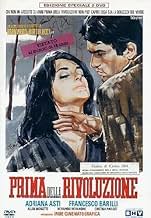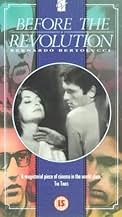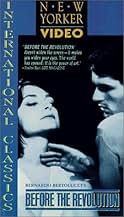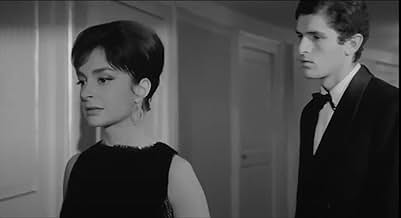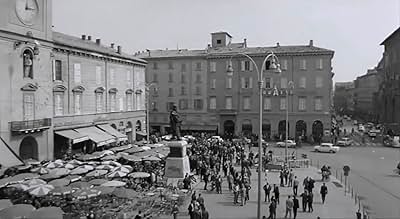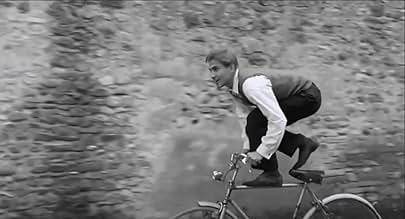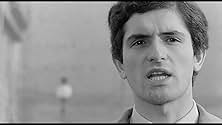Prima della rivoluzione
- 1964
- Tous publics
- 1h 55min
NOTE IMDb
6,8/10
3,3 k
MA NOTE
Après la mort de son ami, un jeune italien se rapproche de plus en plus de sa jeune tante.Après la mort de son ami, un jeune italien se rapproche de plus en plus de sa jeune tante.Après la mort de son ami, un jeune italien se rapproche de plus en plus de sa jeune tante.
- Réalisation
- Scénario
- Casting principal
- Récompenses
- 2 nominations au total
Avis à la une
No question about it that this is a well made film but is it also an interesting one? Not really in my opinion. It doesn't really tell a story and it's hard to say really what point the movie tried to make, if any.
It's more a movie that focuses on its themes, rather than telling a story. It does make this movie confusing to follow at times, since you have no idea what the movie is trying to do or say at times but overall the movie remains still a fascinating one. It's an absorbing movie really, that is well made and put together by its, at the time, 22-year old director Bernardo Bertolucci.
Directing-wise this movie is quite an accomplishment, especially when you're also taking into consideration that this was only Bernardo Bertolucci's second movie. The characters, the actors and some of the sequences are directed really well. Even when you don't understand or like this movie, you'll surely still notice this.
Guess you could interstate this movie in different ways. You could take it as a coming of age movie, as well as a reverse coming of age movie, in which one characters wants progress and change, while the other doesn't want anything to change and actually rather go back in time. Change is really the keyword for this movie. It's filled with references to changes, while new times get welcomed and old times slowly become a thing of the past.
But having said all this, the story still doesn't really make a lasting impression with anything. No real questions are asked in it, since the movie is more often too busy providing answers to things that never really got questioned in the first place. Some more focus and development of the main plot line and its characters wouldn't had harmed the movie.
Not an interesting movie to watch but it can still be a fascinating one at times, as weird as this might sound.
7/10
http://bobafett1138.blogspot.com/
It's more a movie that focuses on its themes, rather than telling a story. It does make this movie confusing to follow at times, since you have no idea what the movie is trying to do or say at times but overall the movie remains still a fascinating one. It's an absorbing movie really, that is well made and put together by its, at the time, 22-year old director Bernardo Bertolucci.
Directing-wise this movie is quite an accomplishment, especially when you're also taking into consideration that this was only Bernardo Bertolucci's second movie. The characters, the actors and some of the sequences are directed really well. Even when you don't understand or like this movie, you'll surely still notice this.
Guess you could interstate this movie in different ways. You could take it as a coming of age movie, as well as a reverse coming of age movie, in which one characters wants progress and change, while the other doesn't want anything to change and actually rather go back in time. Change is really the keyword for this movie. It's filled with references to changes, while new times get welcomed and old times slowly become a thing of the past.
But having said all this, the story still doesn't really make a lasting impression with anything. No real questions are asked in it, since the movie is more often too busy providing answers to things that never really got questioned in the first place. Some more focus and development of the main plot line and its characters wouldn't had harmed the movie.
Not an interesting movie to watch but it can still be a fascinating one at times, as weird as this might sound.
7/10
http://bobafett1138.blogspot.com/
For a while, forget about Bernardo Bertolucci's "ventures into Hollywood" (for example, "Little Buddha," featuring Keannu Reeves) and find time to see his "little-known" work, "Before the Revolution" (his second feature film, which was made in his native country and when he was just 22 years old).
More than a "nostalgic" tribute to the "present," the film is closer in spirit and style to the French New Wave films (see, for example, Jean-Luc Godard's "A Bout de Souffle" and Francois Truffaut's "Jules et Jim";as a matter of fact, Bertolucci's film was contemporaneous with these works).
In the film, you'll find a bedazzling mixture of narrative styles (those relating to camera movements and angles, editing, photographic effects and musical score;my favorites are the "optical room" scene and the old man painting by the lakeside), characters who are always "running away" from something (from social conventions and pressures, from others as well as from themselves) and for whom to live is to discourse (with other people or with themselves), and a "romantic" and "apolitical" stance toward a relevant sociopolitical issue ( in this case, the workers' uprising and the Revolution of 1948).
Initially slow and hard to get by, but the film eventually engages the viewers' attention as "love" starts to develop between the aunt (Gina) and the nephew (Fabrizio), which other people may find "scandalous," but is treated in such a casual and indifferent manner that the result is "unaffecting" (much like the way the menage-a-trois was treated in "Jules et Jim"), and as one gets to know more (or does one?) the quirky and enigmatic characters.
More than a "nostalgic" tribute to the "present," the film is closer in spirit and style to the French New Wave films (see, for example, Jean-Luc Godard's "A Bout de Souffle" and Francois Truffaut's "Jules et Jim";as a matter of fact, Bertolucci's film was contemporaneous with these works).
In the film, you'll find a bedazzling mixture of narrative styles (those relating to camera movements and angles, editing, photographic effects and musical score;my favorites are the "optical room" scene and the old man painting by the lakeside), characters who are always "running away" from something (from social conventions and pressures, from others as well as from themselves) and for whom to live is to discourse (with other people or with themselves), and a "romantic" and "apolitical" stance toward a relevant sociopolitical issue ( in this case, the workers' uprising and the Revolution of 1948).
Initially slow and hard to get by, but the film eventually engages the viewers' attention as "love" starts to develop between the aunt (Gina) and the nephew (Fabrizio), which other people may find "scandalous," but is treated in such a casual and indifferent manner that the result is "unaffecting" (much like the way the menage-a-trois was treated in "Jules et Jim"), and as one gets to know more (or does one?) the quirky and enigmatic characters.
One of the typical ploys of modernist artists has been to take a known work, and to use that as a basis for experimentation. In this case, Bernardo Bertolucci (at the age of 22!) took Stendhal's novel THE CHARTERHOUSE OF PARMA and used the basic plot and characters, only Bertolucci abstracted these elements, taking them for granted and simply creating a wide-ranging collage of impressions and emotions. But the central love affair between Fabrizio and his aunt, Gina (the names of the characters in the Stendhal), is the motivating heart of the film; the suggestions of incest, the need for secrecy, the impacted emotion because of the covertness: these provide PRIMA DELLA RIVOLUZIONE with a core of great integrity, so that the more "random" elements (the scene with the lament on the lake, the scene at the opera, the scene where the friend rides the bicycle in circles, etc.) are able to reflect on Bertolucci's feelings regarding politics, class, revolution, art, the search for belief.
PRIMA DELLA RIVOLUZIONE is one of the most youthful films ever made, as well it should be, since it was made by someone who was impossibly young at the time. I hate to say this, but it's the work of a prodigy, a gifted post-adolescent who is trying to find a form to contain his sometimes overwrought feelings about life, love, and politics. There had been many works catering to the teen crowd, movies like WHERE THE BOYS ARE or BEACH PARTY, but, aside from some of the works of Nicholas Ray (THEY LIVE BY NIGHT and REBEL WITHOUT A CAUSE), no film artist had yet tried to use the medium as a vehicle for a vision of youthful passions from the inside: Godard would follow with MASCULINE FEMININE and LA CHINOISE, Bellocchio with FISTS IN THE POCKET, Skolimowski with LE DEPART and DEEP END, but Bertolucci was pioneering when he made this movie, and the fact that it's "flawed" should not be held against it, as it represents the expression of a very young artist, trying to express his emotions as directly as possible.
PRIMA DELLA RIVOLUZIONE is one of the most youthful films ever made, as well it should be, since it was made by someone who was impossibly young at the time. I hate to say this, but it's the work of a prodigy, a gifted post-adolescent who is trying to find a form to contain his sometimes overwrought feelings about life, love, and politics. There had been many works catering to the teen crowd, movies like WHERE THE BOYS ARE or BEACH PARTY, but, aside from some of the works of Nicholas Ray (THEY LIVE BY NIGHT and REBEL WITHOUT A CAUSE), no film artist had yet tried to use the medium as a vehicle for a vision of youthful passions from the inside: Godard would follow with MASCULINE FEMININE and LA CHINOISE, Bellocchio with FISTS IN THE POCKET, Skolimowski with LE DEPART and DEEP END, but Bertolucci was pioneering when he made this movie, and the fact that it's "flawed" should not be held against it, as it represents the expression of a very young artist, trying to express his emotions as directly as possible.
10zetes
Before the Revolution, Bernardo Bertolucci's second film, is kind of a mess. He was only 22 when he made it, and he must have made it immediately after he finished his first film, Grim Reaper. It's obvious that he's a genius from this film. Like I said, it's kind of a mess, but no more beautiful mess has ever been created in the cinema.
The story is difficult to follow at times, but it is basically about a young bourgeois man who falls in love with his young aunt. Their relationship is socially unacceptable, so it immediately begins to break apart. As it does, politics rush into the film, confused politics, probably representing Bertolucci's own conflicting feelings at this point. The whole film feels very personal.
I don't know. I really didn't catch too much of, well, what's going on. Which sounds bad, but there's a good reason for my missing everything: Bertolucci's direction is breathtaking. It is a nice cross between French New Wave and the Modernist movement that the Italian filmmakers were going through at the time. Bertolucci throws every single cinematic trick into the film that he can fathom. Everything works, though. It's showy, to be sure, but it's never less than one of the most beautiful things I've ever experienced. It never seems less than amazing. The emotions of the film - and they really hit home, even if the story is difficult to follow - are fractured and manic.
I need to watch Before the Revolution again. I feel, though, that even if I find it completely flawed the second time around, it could be nothing less than the greatest flawed masterpiece ever produced. 10 years after Before the Revolution, Bernardo Bertolucci directed what I consider my third favorite film, Last Tango in Paris. By then, he had perfected his style. I'll be adding another Bertolucci film to my list of favorites tonight.
The story is difficult to follow at times, but it is basically about a young bourgeois man who falls in love with his young aunt. Their relationship is socially unacceptable, so it immediately begins to break apart. As it does, politics rush into the film, confused politics, probably representing Bertolucci's own conflicting feelings at this point. The whole film feels very personal.
I don't know. I really didn't catch too much of, well, what's going on. Which sounds bad, but there's a good reason for my missing everything: Bertolucci's direction is breathtaking. It is a nice cross between French New Wave and the Modernist movement that the Italian filmmakers were going through at the time. Bertolucci throws every single cinematic trick into the film that he can fathom. Everything works, though. It's showy, to be sure, but it's never less than one of the most beautiful things I've ever experienced. It never seems less than amazing. The emotions of the film - and they really hit home, even if the story is difficult to follow - are fractured and manic.
I need to watch Before the Revolution again. I feel, though, that even if I find it completely flawed the second time around, it could be nothing less than the greatest flawed masterpiece ever produced. 10 years after Before the Revolution, Bernardo Bertolucci directed what I consider my third favorite film, Last Tango in Paris. By then, he had perfected his style. I'll be adding another Bertolucci film to my list of favorites tonight.
While hailed as many as a masterpiece (or near), I struggled with Bertolucci's 2nd film, made when he was only 23, although I am a fan of his in general. Beautifully shot, great use of music and unconventional editing, the film is excellent on a film-making and craft level (although it perhaps borrows too liberally from leading film-makers of the era, especially Godard, Antonioni and Resnais).
The story of a young bourgeois man trying to come to terms with his tear between his attraction to communism and his desire for an easier life leads him into an incestuous affair with his somewhat older aunt. I found it's themes somewhat muddled, alternating between being heavy-handedly spelled out, or so obtuse I wasn't sure what a given scene was saying.
The acting in particular seems a bit all over the place; understated to the point of flatness in one scene, and then almost theatrically over the top the next. At the end I felt glad I'd seen the film, but it didn't stick with me the way Bertolucci's first film "La Commare Secca" or his third "Partner" did. ("Partner" deals with some of the same themes, but in a far more playful, often comedic way). There was a film-school sort of pretentiousness and emotional distance in "Before the Revolution that kept me from feeling moved or from being led to think deeply about the ideas.
That said, I am willing to revisit it and see if my reaction changes, and certainly I enjoyed Bertolucci's already masterful use of image and sound, even if the ends he was using them to were a bit muddled.
The story of a young bourgeois man trying to come to terms with his tear between his attraction to communism and his desire for an easier life leads him into an incestuous affair with his somewhat older aunt. I found it's themes somewhat muddled, alternating between being heavy-handedly spelled out, or so obtuse I wasn't sure what a given scene was saying.
The acting in particular seems a bit all over the place; understated to the point of flatness in one scene, and then almost theatrically over the top the next. At the end I felt glad I'd seen the film, but it didn't stick with me the way Bertolucci's first film "La Commare Secca" or his third "Partner" did. ("Partner" deals with some of the same themes, but in a far more playful, often comedic way). There was a film-school sort of pretentiousness and emotional distance in "Before the Revolution that kept me from feeling moved or from being led to think deeply about the ideas.
That said, I am willing to revisit it and see if my reaction changes, and certainly I enjoyed Bertolucci's already masterful use of image and sound, even if the ends he was using them to were a bit muddled.
Le saviez-vous
- AnecdotesBernardo Bertolucci was only 22 when he made this film.
- ConnexionsFeatured in Nathalie... (2003)
Meilleurs choix
Connectez-vous pour évaluer et suivre la liste de favoris afin de recevoir des recommandations personnalisées
- How long is Before the Revolution?Alimenté par Alexa
Détails
Box-office
- Montant brut mondial
- 9 815 $US
- Durée
- 1h 55min(115 min)
- Couleur
- Mixage
- Rapport de forme
- 1.85 : 1
Contribuer à cette page
Suggérer une modification ou ajouter du contenu manquant

![Regarder Trailer [OV]](https://m.media-amazon.com/images/M/MV5BNWRiN2E3YjYtNmI2MC00ZjdmLWE2N2EtYWFjYTNjZTRmZTZiXkEyXkFqcGdeQXRodW1ibmFpbC1pbml0aWFsaXplcg@@._V1_QL75_UX500_CR0)
